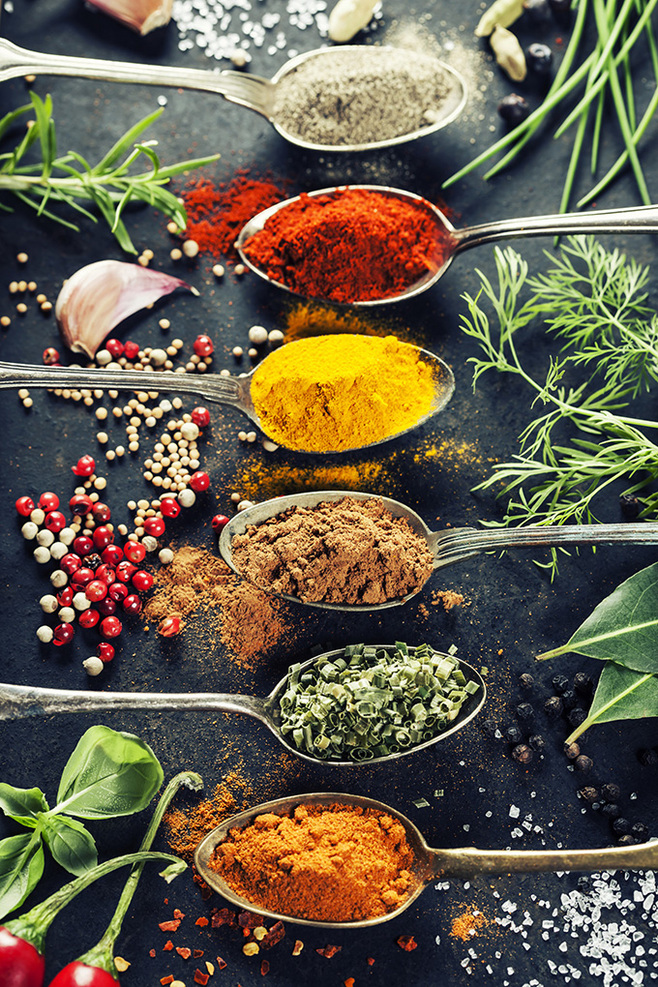
Spices are more than flavor enhancers. They are a testament to the rich history of human civilization and possess a multitude of health benefits. By incorporating spices into our diets, we not only elevate our culinary experience but support our overall well-being. Spices played a significant role in shaping the cuisines of different regions, blending flavors and techniques to create unique and diverse culinary traditions.
As we touch on the fascinating history of spices and explore their diverse health-promoting properties, we see why they are essential for making your foods taste delicious. Some of the more common spices, such as cinnamon and turmeric, have long been prized commodities. They were sought after for their exotic flavors and medicinal properties. The quest for spices led to the exploration of new trade routes, including the famous Silk Road, which facilitated cultural exchanges and shaped civilizations. They have been an integral part of human culinary traditions for thousands of years. Beyond their ability to add vibrant flavors and aromas to dishes, spices also possess a range of health benefits that have been recognized since ancient times.
Let’s look at some of our most used spices and the direct health benefits they offer.
Cinnamon
This warm, familiar, sweet spice has great health benefits. It’s antiseptic and has potent antioxidants which help fight inflammation. Most importantly, cinnamon has been shown to lower cholesterol and triglycerides in the blood. It may lower blood sugar in several ways, including slowing the breakdown of carbs in the digestive tract and improving insulin sensitivity. This flavorful spice boosts your metabolism and leaves you warmed up for hours. Great benefits for our Canadian winters.
Cloves
Cloves are a very strong both in flavor and healing properties. Cloves have the highest number of antioxidants than most other common herbs and spices. They are a natural painkiller and attack germs. Cloves help to get rid of sore throats, tooth aches and relieve upper respiratory infections. The strong, aromatic, warm clove is versatile, yet sometimes difficult to integrate into everyday meals and snacks. Cloves, go well together with cinnamon and are delicious in baked goods.
Cumin
Cumin has several digestive benefits and provides many important nutrients, such as phosphorus, thiamine, and potassium. It’s also been shown to help with several conditions that affect people with diabetes. It’s strong, distinctive flavor blends wonderfully with pork, stews and vegetables.
Turmeric
Turmeric is one of the most powerful, health spices on Earth. The most potent component is its oil, which contains the yellow or orange pigment called curcumin. (It will stain your counters, clothing and skin.) Numerous studies show that curcumin’s anti-inflammatory effects are comparable to over-the-counter anti-inflammatory drugs. It’s also an effective treatment for inflammatory bowel syndrome and acts as a powerful antioxidant. It may neutralize free radicals, which are chemicals that travel through the body and cause damage to healthy cells and cell membranes.
Ginger
Alternative medicine has used ginger in treatments for thousands of years. Studies show that even a small amount of ginger can help fight nausea caused by morning sickness, seasickness, and chemotherapy. Like turmeric, ginger has strong anti-inflammatory properties that make it useful as a supplement for pain management.
Rosemary
Rosemary’s active ingredient is rosmarinic acid. It is unbeatable when it comes to fighting allergic responses and nasal congestion. It offers an entire immune system boost and is critical during times of flu, common cold and allergy attacks. Rosemary can improve your body’s circulation to help keep the heart and blood vessels in great condition. It calms the digestive system, so rosemary tea is great if you experience indigestion.
Cayenne Pepper
Cayenne pepper has a cleansing effect on the body. It helps to get rid of bacteria and fungi. Its ability to stimulate a pain response in a different area of the body, thus diverting the brain’s attention to the new site, helps with migraine pain. It’s also a great digestive aid, stimulating the digestive tract and increasing enzyme production and the flow of gastric juices. This aids the body’s ability to metabolize food and expel toxins. Cayenne pepper is spicy and warming, with a hot, peppery taste, and it’s great for spicy Indian dishes or grilled meats.
Sage
Sage comes from the same plant family as rosemary. From as early as the Middle Ages, sage is believed to have strong healing properties. Sage is a great anti-inflammatory and may provide relief from conditions like arthritis or anything else brought on by excessive inflammation in the body. Additionally, current research indicates that sage may be able to improve brain function and memory, especially in people with Alzheimer’s disease. Sage has a bitter, earthy flavor. Try it with pasta sauces or fry with butter to garnish roasted potatoes or risottos.
Fennel
Fennel bulbs and seeds are a great source of vitamin C, and regular consumption of fennel helps support a healthy immune system and lower the risk of heart and eye diseases. It’s rich in antioxidants that protect your body from free radical damage and slow the process of skin aging. The top part of the fennel bulb is where you find most of the flavor. You can use it for soups, stews, and casseroles. It tastes like black licorice or licorice root, but it’s a little bit softer and more subtle.
Curry
Curry mix is loaded with health benefits because it’s made up of many healthy spices. Some of the most common ingredients in curry include turmeric, fenugreek, coriander, cinnamon, and ginger. Research credits curry powder with anti-inflammatory benefits and anti-cancer properties. You don’t have to use curry powder just to make a curry; you can experiment with it and use it in several different dishes. Try sprinkling it on a side of vegetables for an instant flavor upgrade and nutrition boost.
Parsley
Parsley has lots of Vitamin C, which helps to boost your immune system. It also soothes pain caused by inflammatory conditions and reduces free radical damage. Parsley may improve your heart health by providing the B vitamins your cardiovascular system needs to do its job. It freshens your breath after a meal and provides several important minerals. Parsley has a fresh green taste, and it’s a perfect addition to salads, smoothies or roasted vegetables.
Explore the world of spices and blends. Embrace their history, and savor the delicious flavors they offer, all while nourishing your body, soul and tastebuds.
